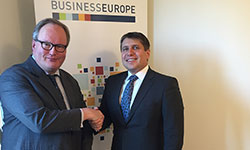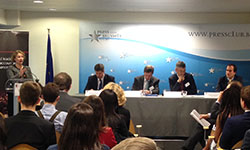BusinessEurope Headlines No. 2016-03
Towards a better framework for innovation
 To build a political momentum to make Europe a better place to innovate was the objective of the conference organised by BusinessEurope, the ERT and the ERF. Markus J. Beyrer, Director General of BusinessEurope, stressed the key role that the "Innovation principle" can play in creating the right framework for innovation and foster a beneficial culture of entrepreneurship. It is proposed to enrich and improve the quality and application of EU legislation, he added, to stimulate confidence and investment in innovation. High-level speakers and key stakeholders gathered at the Permanent Representation of the Netherlands to the EU to discuss concrete proposals to boost innovation governance, better innovation regulation and science-based policy-making.
To build a political momentum to make Europe a better place to innovate was the objective of the conference organised by BusinessEurope, the ERT and the ERF. Markus J. Beyrer, Director General of BusinessEurope, stressed the key role that the "Innovation principle" can play in creating the right framework for innovation and foster a beneficial culture of entrepreneurship. It is proposed to enrich and improve the quality and application of EU legislation, he added, to stimulate confidence and investment in innovation. High-level speakers and key stakeholders gathered at the Permanent Representation of the Netherlands to the EU to discuss concrete proposals to boost innovation governance, better innovation regulation and science-based policy-making.
Read more, check photo album of the conference or contact: Jan Bambas
China's "new normal": what's in it for businesses?
 The best path to sustainable growth in China is through an open economy that fosters a level playing field between foreign and domestic companies. China should therefore not be tempted to restrict foreign businesses from participating fully in its economy at a time of slower growth. European businesses can provide best practices and answers to many of the challenges that China’s economy is currently facing. Nevertheless, this year also features some complex decisions in our bilateral economic relationship with China. These are some of the key messages from the panel on the state of play in EU-China relations and the way ahead organised by BusinessEurope on 28 January with Director General Markus J. Beyrer, European Commissioner Cecilia Malmström and President of the European Union Chamber of Commerce Joerg Wuttke. China’s slowing growth, EU’s decision on how to treat China in anti-dumping investigations after December 2016 and the EU-China investment negotiations will top the agenda for 2016.
The best path to sustainable growth in China is through an open economy that fosters a level playing field between foreign and domestic companies. China should therefore not be tempted to restrict foreign businesses from participating fully in its economy at a time of slower growth. European businesses can provide best practices and answers to many of the challenges that China’s economy is currently facing. Nevertheless, this year also features some complex decisions in our bilateral economic relationship with China. These are some of the key messages from the panel on the state of play in EU-China relations and the way ahead organised by BusinessEurope on 28 January with Director General Markus J. Beyrer, European Commissioner Cecilia Malmström and President of the European Union Chamber of Commerce Joerg Wuttke. China’s slowing growth, EU’s decision on how to treat China in anti-dumping investigations after December 2016 and the EU-China investment negotiations will top the agenda for 2016.
Contact: Maurice Fermont
Innovation principle can foster entrepreneurship
 “Too much regulation and prescriptiveness can stifle innovation. That is why Europe needs the Innovation principle, complementing the precautionary approach, to protect Europe’s ability to innovate. We cannot only assess risks, we must also grasp opportunities”, Markus J. Beyrer told Education and Research Ministers at the informal Competitiveness Council in Amsterdam on 27 January. Beyrer commented on the Innovation principle and other topics such as scientific evidence, better regulation and innovation, which were discussed at the conference “A better framework for innovation” by BusinessEurope, the ERT and the ERF on 26 January in Brussels.
“Too much regulation and prescriptiveness can stifle innovation. That is why Europe needs the Innovation principle, complementing the precautionary approach, to protect Europe’s ability to innovate. We cannot only assess risks, we must also grasp opportunities”, Markus J. Beyrer told Education and Research Ministers at the informal Competitiveness Council in Amsterdam on 27 January. Beyrer commented on the Innovation principle and other topics such as scientific evidence, better regulation and innovation, which were discussed at the conference “A better framework for innovation” by BusinessEurope, the ERT and the ERF on 26 January in Brussels.
Contact: Jan Bambas
Discussing trade priorities with Commissioner Malmström
 2016 will be a decisive year for many ongoing EU trade negotiations like the ones with the USA or Japan. This year is also important for EU-China relations, with the EU assessing how to treat China in anti-dumping procedures. This should also be the year of CETA - the agreement concluded with Canada. The EU is also changing its approach to investment protection with the investment court system now being proposed to all countries we are negotiating with. BusinessEurope highlighted the importance of maintaining a high level of ambition in our negotiations with the USA and Japan and not falling in the temptation of early harvest or the “TPP model”. The need to ensure a high level of protection for European investors in third countries is key. BusinessEurope once more expressed its concerns about the new investment court system proposal and how European investors might get into a worse situation than many of their competitors. This is particularly the case in Asia as many of our negotiating partners have joined the Transpacific Partnership that includes investor-to-state dispute settlement.
2016 will be a decisive year for many ongoing EU trade negotiations like the ones with the USA or Japan. This year is also important for EU-China relations, with the EU assessing how to treat China in anti-dumping procedures. This should also be the year of CETA - the agreement concluded with Canada. The EU is also changing its approach to investment protection with the investment court system now being proposed to all countries we are negotiating with. BusinessEurope highlighted the importance of maintaining a high level of ambition in our negotiations with the USA and Japan and not falling in the temptation of early harvest or the “TPP model”. The need to ensure a high level of protection for European investors in third countries is key. BusinessEurope once more expressed its concerns about the new investment court system proposal and how European investors might get into a worse situation than many of their competitors. This is particularly the case in Asia as many of our negotiating partners have joined the Transpacific Partnership that includes investor-to-state dispute settlement.
Contact: Luisa Santos
Topical issues discussed with ALDE Party President
 The importance of Schengen for the European Union, the migration debate, the future of the Economic and Monetary Union, climate policies, trade agreements, and the need for all pro-European forces to engage firmly in these debates – these and other topical issues were discussed by BusinessEurope Director General Markus J. Beyrer meeting Hans van Baalen, President of the ALDE Party, on 25 January. Mr van Baalen and Mr Beyrer looked at the main topics the Dutch Presidency will deal with in the coming six months, and also agreed on the need for member states to implement a number of European laws better.
The importance of Schengen for the European Union, the migration debate, the future of the Economic and Monetary Union, climate policies, trade agreements, and the need for all pro-European forces to engage firmly in these debates – these and other topical issues were discussed by BusinessEurope Director General Markus J. Beyrer meeting Hans van Baalen, President of the ALDE Party, on 25 January. Mr van Baalen and Mr Beyrer looked at the main topics the Dutch Presidency will deal with in the coming six months, and also agreed on the need for member states to implement a number of European laws better.
Contact: Christian Feustel
CETA: an ambitious agreement that should move forward
 European business is committed to support moving forward with the Comprehensive Economic and Trade Agreement, a deal with Canada that will create jobs and make our economies more competitive and innovative, BusinessEurope said at a meeting with Jacques Daoust, Minister of the Economy, Innovation and Exports of Quebec on 25 January. Quebec is one of the provinces that took direct part in the negotiations and made an ambitious outcome possible in a key chapter of the agreement: public procurement. Other remarkable achievements include the improved access to service and investment markets, the protection of intellectual property rights including for geographical indications, customs and trade facilitation provisions, making it the most ambitious deal concluded so far by either the EU or Canada.
European business is committed to support moving forward with the Comprehensive Economic and Trade Agreement, a deal with Canada that will create jobs and make our economies more competitive and innovative, BusinessEurope said at a meeting with Jacques Daoust, Minister of the Economy, Innovation and Exports of Quebec on 25 January. Quebec is one of the provinces that took direct part in the negotiations and made an ambitious outcome possible in a key chapter of the agreement: public procurement. Other remarkable achievements include the improved access to service and investment markets, the protection of intellectual property rights including for geographical indications, customs and trade facilitation provisions, making it the most ambitious deal concluded so far by either the EU or Canada.
Contact: Eleonora Catella
Future of EU SME policy discussed by EP SME Intergroup
 “The EU should support SMEs both through a strengthened EU pro-SME action agenda and through energising the national SME policies”, Markus J. Beyrer, Director General of BusinessEurope, said at the SME Intergroup meeting convened by its President, MEP Otmar Karas, on 26 January. Kristin Schreiber, Director at the European Commission DG GROW, and representatives from SME organisations addressed the audience. BusinessEurope supports the approach of integrating SME elements in key EU policies, but also calls for strengthening the EU horizontal SME policy, taking the Small Business Act (SBA) one step further. A revised and enhanced SBA would also help develop more and better national pro-SME initiatives.
“The EU should support SMEs both through a strengthened EU pro-SME action agenda and through energising the national SME policies”, Markus J. Beyrer, Director General of BusinessEurope, said at the SME Intergroup meeting convened by its President, MEP Otmar Karas, on 26 January. Kristin Schreiber, Director at the European Commission DG GROW, and representatives from SME organisations addressed the audience. BusinessEurope supports the approach of integrating SME elements in key EU policies, but also calls for strengthening the EU horizontal SME policy, taking the Small Business Act (SBA) one step further. A revised and enhanced SBA would also help develop more and better national pro-SME initiatives.
Read more or contact: Daniel Cloquet
Photo © EuroCommerce (Mette Bjerg)
Digital transformation must be at the core of the European competitiveness agenda
 The ongoing fourth industrial revolution is radically modifying the global economy, and particularly manufacturing and industry-related services. If we succeed, Europe could see a gross added value worth 1.25 trillion euros by 2025 in manufacturing alone. This is the message that Cecilia Zappalà, BusinessEurope Adviser for the digital economy, expressed at the Industry Roundtable with European digital entrepreneurs organised on 27 January in Amsterdam by the Confederation of Netherlands Industry and Employers VNO-NCW. The event, which took place on the margins of the informal Competitiveness Council, brought together entrepreneurs from all EU member states to discuss the digital economy with European Commissioner Oettinger and European competitiveness ministers. “We need to encode digitalisation in EU policy and in the European economic DNA to allow citizens and business to take advantage of this massive potential”, Cecilia Zappalà stressed.
The ongoing fourth industrial revolution is radically modifying the global economy, and particularly manufacturing and industry-related services. If we succeed, Europe could see a gross added value worth 1.25 trillion euros by 2025 in manufacturing alone. This is the message that Cecilia Zappalà, BusinessEurope Adviser for the digital economy, expressed at the Industry Roundtable with European digital entrepreneurs organised on 27 January in Amsterdam by the Confederation of Netherlands Industry and Employers VNO-NCW. The event, which took place on the margins of the informal Competitiveness Council, brought together entrepreneurs from all EU member states to discuss the digital economy with European Commissioner Oettinger and European competitiveness ministers. “We need to encode digitalisation in EU policy and in the European economic DNA to allow citizens and business to take advantage of this massive potential”, Cecilia Zappalà stressed.
Contact: Cecilia Zappalà
Calling for a renewed strategy on flexicurity
 Competitiveness is the main driver of growth, prosperity and job creation. More should be done at EU and national levels to improve the cost and non-cost competitiveness of European markets. We need a renewed commitment to flexicurity principles on European labour markets to make them more open, mobile and dynamic. Strengthening the employment recovery, seizing the benefits of digital transformation, successfully integrating refugees in the labour market and adapting to demographic change are among the key challenges on European labour markets. These were the key messages presented by Maxime Cerutti, BusinessEurope’s Social Affairs Director, at a conference on employment and social developments in Europe organised on 21 January 2016 in Brussels.
Competitiveness is the main driver of growth, prosperity and job creation. More should be done at EU and national levels to improve the cost and non-cost competitiveness of European markets. We need a renewed commitment to flexicurity principles on European labour markets to make them more open, mobile and dynamic. Strengthening the employment recovery, seizing the benefits of digital transformation, successfully integrating refugees in the labour market and adapting to demographic change are among the key challenges on European labour markets. These were the key messages presented by Maxime Cerutti, BusinessEurope’s Social Affairs Director, at a conference on employment and social developments in Europe organised on 21 January 2016 in Brussels.
Contact: Magdalena Bober
Macroeconomic discussions with EU institutions and social partners
 “Economic recovery in the European Union is expected to continue steadily in 2016”, BusinessEurope Economics Director James Watson said at the Macroeconomic Dialogue (MED) at technical (working group) level on 25 January 2016. The MED provides a forum for exchanging views between the European Commission, Council, European Central Bank and social partners. James Watson also highlighted that to back a stronger recovery over the long term, the EU must address structural obstacles to growth and improve competitiveness. The MED at political level will take place on 11 February.
“Economic recovery in the European Union is expected to continue steadily in 2016”, BusinessEurope Economics Director James Watson said at the Macroeconomic Dialogue (MED) at technical (working group) level on 25 January 2016. The MED provides a forum for exchanging views between the European Commission, Council, European Central Bank and social partners. James Watson also highlighted that to back a stronger recovery over the long term, the EU must address structural obstacles to growth and improve competitiveness. The MED at political level will take place on 11 February.
Contact: Frederik Lange
Employability should be starting point for EU skills agenda
 The EU upcoming skills agenda needs to focus on the overarching goal of fostering employability so as to increase productivity and competitiveness. This was the main message given by Maxime Cerutti, BusinessEurope’s Social Affairs Director, at a special consultation meeting with social partners on 20 and 21 January. Better alignment of the needs of labour markets with education and training systems should be the guiding principle for achieving this goal. Within this there needs to be a focus on learning outcomes in education and training systems at all levels. In particular, the agenda should look at ways to promote digital skills and to overcome shortages in the number of people studying science, technology, engineering and mathematics related subjects.
The EU upcoming skills agenda needs to focus on the overarching goal of fostering employability so as to increase productivity and competitiveness. This was the main message given by Maxime Cerutti, BusinessEurope’s Social Affairs Director, at a special consultation meeting with social partners on 20 and 21 January. Better alignment of the needs of labour markets with education and training systems should be the guiding principle for achieving this goal. Within this there needs to be a focus on learning outcomes in education and training systems at all levels. In particular, the agenda should look at ways to promote digital skills and to overcome shortages in the number of people studying science, technology, engineering and mathematics related subjects.
Contact: Robert Plummer
Successful resolution of Safe Harbour negotiations is urgent
 The disruption of international data flows and its impact on business were discussed at the Academy of European Law (ERA) conference on Safe harbour that took place in Brussels on 26 January. Guido Lobrano, Deputy Director at BusinessEurope, stressed that the invalidation of the Safe Harbour mechanism is creating a legal vacuum in relation to international data transfers. These transfers affect any type of commercial transaction and therefore all business sectors. The consequences of the annulment go also beyond Safe Harbour users as they affect their commercial partners, and may potentially affect transfers to other third countries. Additional insecurity is due to the possible inconsistent enforcement approach by national data protection authorities, leaving companies in a situation of legal uncertainty which needs to be solved as soon as possible by a new agreement on a revised framework for EU-US data transfers.
The disruption of international data flows and its impact on business were discussed at the Academy of European Law (ERA) conference on Safe harbour that took place in Brussels on 26 January. Guido Lobrano, Deputy Director at BusinessEurope, stressed that the invalidation of the Safe Harbour mechanism is creating a legal vacuum in relation to international data transfers. These transfers affect any type of commercial transaction and therefore all business sectors. The consequences of the annulment go also beyond Safe Harbour users as they affect their commercial partners, and may potentially affect transfers to other third countries. Additional insecurity is due to the possible inconsistent enforcement approach by national data protection authorities, leaving companies in a situation of legal uncertainty which needs to be solved as soon as possible by a new agreement on a revised framework for EU-US data transfers.
Read more or contact: Guido Lobrano
Business services need to go across the border
 Business services such as accountancy, consulting, ICT services, logistics and shipping are delivered to other companies. Their efficiency directly impacts the competitiveness of the European economy as a whole. At the same time, we see that the cross-border provision of these services is still underdeveloped. This was stressed by BusinessEurope Senior Adviser Jeroen Hardenbol at a single market conference organised by the Institute of Chartered Accountants in England and Wales (ICAEW) on 27 January, with among other European Parliament IMCO Chair Vicky Ford and Jürgen Tiedje, Head of Unit for services at the European Commission DG GROW. The single market strategy presented by the European Commission in October last year rightly focuses on business services and contains a number of good proposals to unleash the growth potential. BusinessEurope supports the idea of a services passport, but much will depend on the details of the proposal. Progress could also be made through improved online business portals on a digital single gateway that should provide companies all the information and assistance they need to provide services in another member state.
Business services such as accountancy, consulting, ICT services, logistics and shipping are delivered to other companies. Their efficiency directly impacts the competitiveness of the European economy as a whole. At the same time, we see that the cross-border provision of these services is still underdeveloped. This was stressed by BusinessEurope Senior Adviser Jeroen Hardenbol at a single market conference organised by the Institute of Chartered Accountants in England and Wales (ICAEW) on 27 January, with among other European Parliament IMCO Chair Vicky Ford and Jürgen Tiedje, Head of Unit for services at the European Commission DG GROW. The single market strategy presented by the European Commission in October last year rightly focuses on business services and contains a number of good proposals to unleash the growth potential. BusinessEurope supports the idea of a services passport, but much will depend on the details of the proposal. Progress could also be made through improved online business portals on a digital single gateway that should provide companies all the information and assistance they need to provide services in another member state.
Read more or contact: Jeroen Hardenbol
Calendar
 1 February: EIB Board of Directors seminar with civil society 2016
1 February: EIB Board of Directors seminar with civil society 2016- 1-4 February: European Parliament plenary sitting, Strasbourg
- 3 March 2016: BusinessEurope Day 2016
Contact: BusinessEurope Headlines